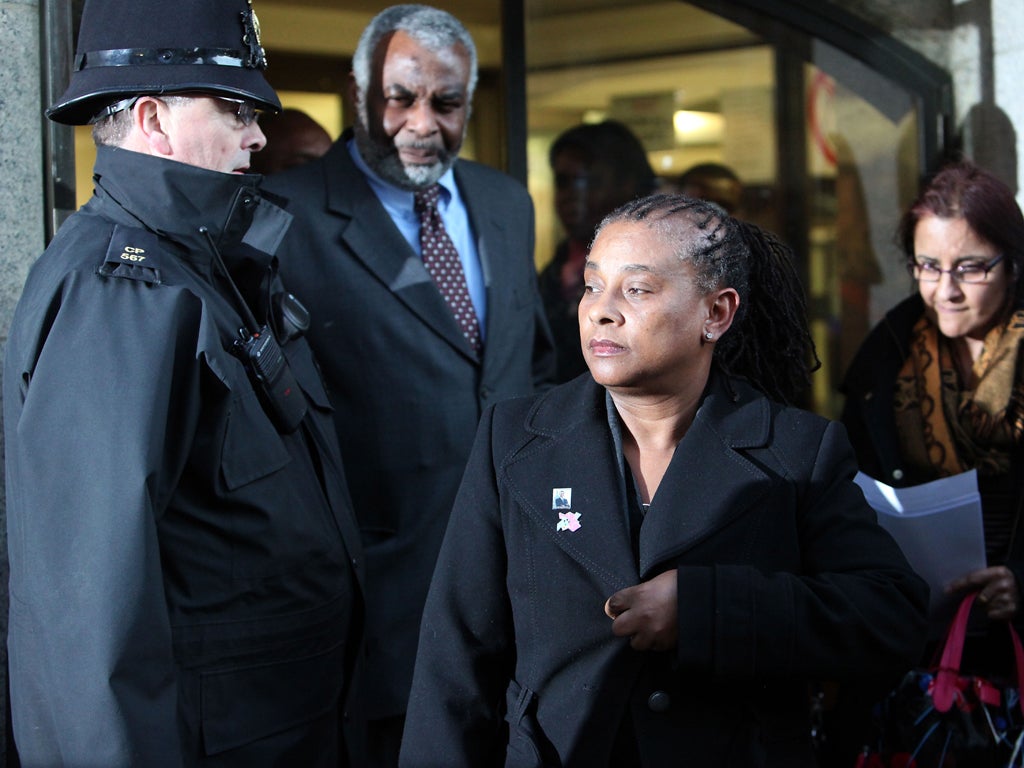How love can be torn apart
Stephen Lawrence’s murder destroyed his parents’ relationship so utterly that they endured his killers’ trial without sharing a word. Nina Lakhani on why such bitter tragedy is so toxic

The emotional gulf between Neville and Doreen Lawrence outside the Old Bailey was agonisingly wide.
Despite the strained relief drawn on faces that showed every month of their 18-year struggle for justice, they were unable to share the moment. The couple divorced in 1999 – six years after the racist murder of their eldest son Stephen.
Yet in an interview published yesterday, Neville described how the grief of losing Stephen destroyed their marriage almost immediately. "For some reason that I've tried to understand – and I still don't – we couldn't reach out to one another," he told the Daily Mail. "We stayed together for another six years, but from that day we never physically touched one another again. We didn't cuddle or hold hands for comfort, as you might expect a couple to do. We would sleep in the same bed, but lay side-by-side like statues," he added.
No one else, not even Stephen's younger brother, Stuart, or sister, Georgina, would have experienced the same intense mix of fear and apprehension felt by Mr and Mrs Lawrence as they awaited a verdict. But the two waited in separate rooms, and when the moment came, there was no embrace, not even a handshake.
For a family affected by homicide, the implications are enormous. Almost one in two couples separate or divorce in the aftermath, according to research by the former government Victims Commissioner, Louise Casey. Psychological problems such as post-traumatic stress disorder and depression are also common as parents struggle to work through the engulfing guilt, anger and shame.
Elaine Douglas, a charted psychologist and spokeswoman for the British Psychological Society, said: "When you lose a child, it is not the natural order of things because as a parent, you know you should go first. The feelings of guilt, blame and anger are stronger and last longer when it is a murder; the feelings are irrational but understandable.
"The feelings of grief are so intense and all-consuming, that it makes thinking about another person's needs very difficult."
The initial physical and psychological shock which can render parents unable to relate to anyone else, not even each other, is "normal". The ability to emotionally reconnect after such a loss is dependent on a couple's ability to recognise and help meet each other's needs. This in part will depend on the shape of the relationship beforehand.
Both Neville and Doreen agree their relationship was difficult before Stephen was killed. Neville, a builder, was unemployed, while Doreen was blossoming as a trainee teacher. This rift, according to interviews with Doreen, was widening and would have probably led to the marriage ending regardless of Stephen's death. Neville doesn't agree. He said in the interview he believed they would still be married today.
Linda Blair, a clinical psychologist, said: "Whenever the dreams of a parent are shattered, especially when it's an unexpected and unnecessary death, they turn into themselves. Relationships can and do survive this, but it can take weeks or months before they can begin to recreate a family, though it is very hard to without professional help. If people are in the habit of not communicating, then it is a much harder mountain to climb."
Lyn Costello, from Mothers Against Murder and Aggression, said: "We now recognise that families affected by murder suffer tremendously. It is hoped that the introduction of free therapies will see a reduction in the numbers of parents who separate."
The couples' existing problems undoubtedly compromised their ability, and possibly the need, to understand and help one another. Neville said: "Doreen has said that I closed up. But why? Because I felt such pain. I didn't see the need to speak about it – I just assumed she must be feeling exactly the same as me. It didn't occur to me until much later that people can grieve in different ways.
"In 18 years, me and Doreen have still never once talked about what happened to Stephen that night. About how he died and how it affected us." And so the grief tore them apart.
Case Study
'Nothing as painful could ever happen to us again'
Shannon Nolan was murdered by her husband in 2001 after he had subjected her to a decade of violence. She was just 24 and pregnant with their daughter. Her mother, Sherry Nolan, from Ohio, volunteers with the National Organisation of Parents of Murdered Children
You start off thinking there has to be a reason why it happened. You blame yourself, and then you blame each other, and then friends and family start to blame you too. You lose people because they blame you or think you're contagious; only the most courageous people stick with you.
Me and my husband felt like we died on the day Shannon's body was found, but eventually worked out that only her husband was to blame, and that if we could survive this, nothing as painful could happen again. We have both changed: I am much stronger, he is more depressed, and while we have issues, we are together. The majority of couples do not stay together.We have found that helping and educating other people is healing for us, though some people think talking about Shannon so much is unhealthy.
Subscribe to Independent Premium to bookmark this article
Want to bookmark your favourite articles and stories to read or reference later? Start your Independent Premium subscription today.
